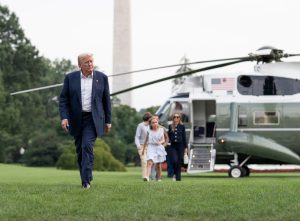Cambodia’s government will officially nominate U.S. President Donald Trump for the Nobel Peace Prize, following his efforts to broker a ceasefire in the country’s border conflict with Thailand.
Speaking to reporters in the capital Phnom Penh on Friday, Deputy Prime Minister Sun Chanthol thanked Trump for bringing peace and said he deserved to be nominated for the prize. Later, a journalist from Reuters asked him via text message whether this meant Cambodia would nominate the U.S. leader, to which he responded, “Yes.” Similar calls have since echoed across Cambodian social media.
Chanthol’s comments came shortly after Trump’s updated tariff announcement, which saw Cambodia’s import duty dropped to 19 percent, down from the 36 percent threatened in July and the 49 percent initially announced in April. Chanthol headed the negotiation team that engaged in economic talks with the Trump administration.
In Malaysia on July 28, Cambodia and Thailand agreed to a ceasefire to end a fierce, five-day border conflict that killed at least 43 people and displaced more than 300,000 people in both countries. According to a report by Reuters that interviewed numerous officials on both sides, a phone call from Trump was crucial in breaking the “deadlock” between the two nations and getting them to agree to the meeting in Malaysia. In particular, Trump reportedly threatened to cut off trade talks with both nations if they did not cease hostilities.
Cambodia is not the first nation to suggest that Trump should be awarded the illustrious prize. Israeli Prime Minister Benjamin Netanyahu said last month that he had nominated Trump for the award for helping bring his nation’s war with Iran to an end. Pakistan also said that it would recommend Trump for the Nobel Peace Prize for his work in helping to resolve its short conflict with India in May.
Trump has a seeming obsession with winning the Nobel Peace Prize, which may have something to do with his long-standing rivalry with former President Barack Obama, who was infamously awarded the prize in 2009, in the first year of his first term in office, seemingly in advance payment for achievements that never eventuated.
White House Press Secretary Karoline Leavitt said last week that “it is well past time that President Trump was awarded the Nobel Peace Prize.”
Since his inauguration, Trump “has brokered, on average, one peace deal or ceasefire per month,” Leavitt said. In addition to the Cambodia-Thailand conflict, she mentioned conflicts between “Israel and Iran, Rwanda and the Democratic Republic of the Congo, India and Pakistan, Serbia and Kosovo, and Egypt and Ethiopia.”
While it is hard to see the Norwegian Nobel Committee taking seriously a Trump nomination, even if he has arguably done more to deserve it than Obama, the prize has a decidedly ambiguous history. In a classic article from 2009, Christopher Hitchens noted the prize’s long history of being awarded “for service to cynicism, opportunism, and hypocrisy.” Under this roll of names, he wrote, could be found those of Yasir Arafat and Henry Kissinger, and their Israeli and North Vietnamese counterparts, who were “garlanded for ‘peace’ agreements that were not intended to hold and that led to later outbreaks of lethal violence.” The absurdity of Trump being awarded the Nobel Peace Prize is seemingly not an insuperable bar.
In any event, whether the peace between Cambodia and Thailand is a lasting one remains to be seen. For now, the ceasefire appears to be holding, but the situation remains far from settled, with both nations making claims and counterclaims that have kept the temperature elevated. Thailand continues to hold 18 Cambodian prisoners that it reportedly captured on Tuesday morning, shortly after the ceasefire came into effect. Meanwhile, Cambodia’s Ministry of National Defense yesterday claimed that Thailand was preparing to launch an “imminent” attack along the border last night, and urged the world “to act swiftly to prevent any escalation.” No attacks took place, and the situation along the border remained calm as of this morning, as officials from both nations gathered in Malaysia for a four-day meeting of the General Border Committee, aimed at de-escalating tensions.

































